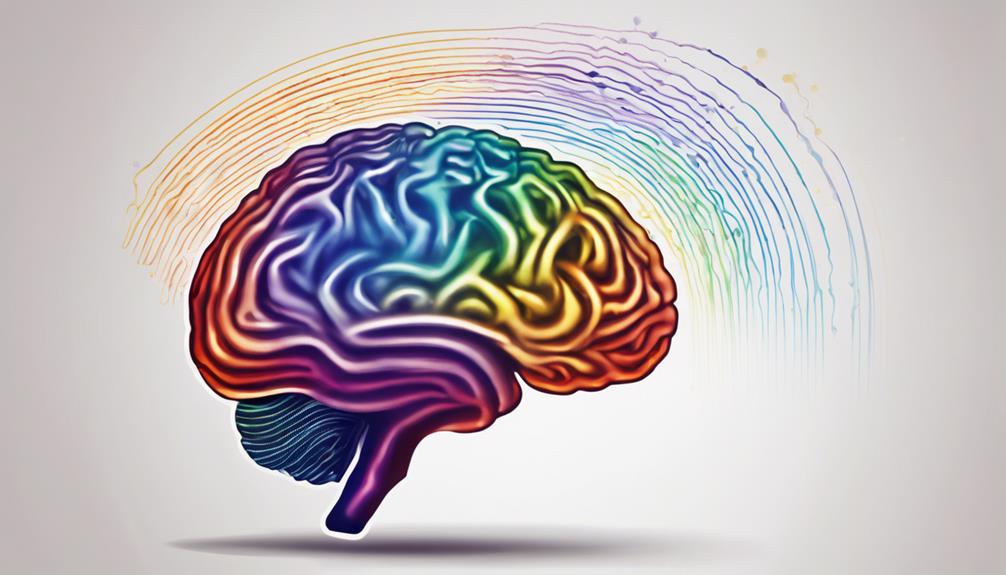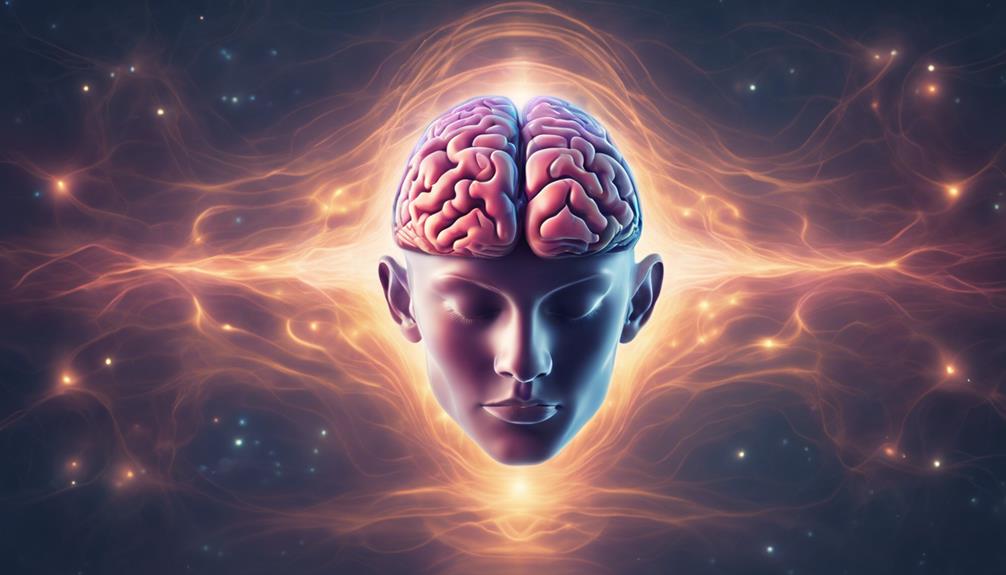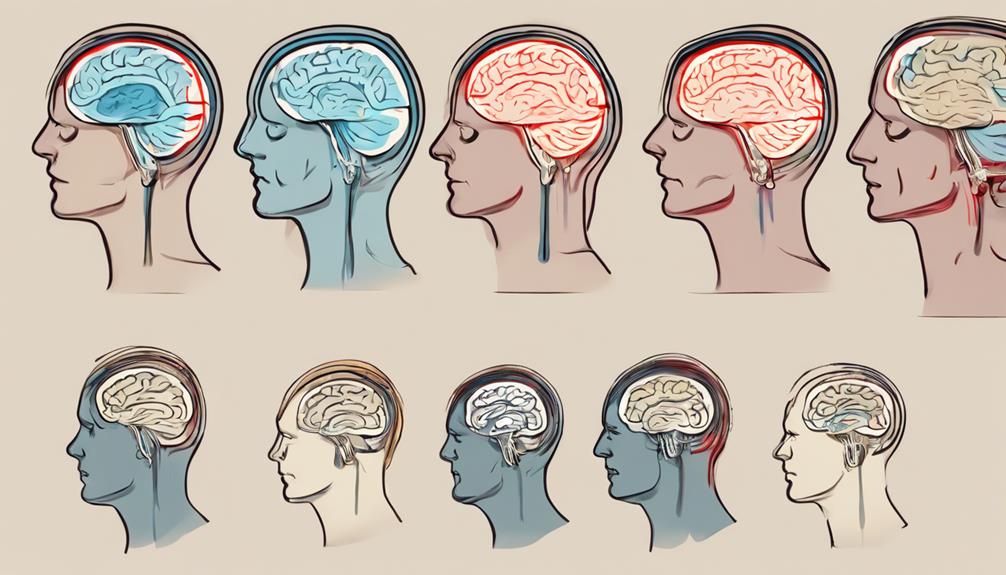Hypnosis influences brain wave patterns by elevating theta waves associated with deep relaxation and suggestibility, while reducing beta waves related to active alertness. These changes shed light on the neurological impact of this altered state of consciousness. The increase in alpha waves during hypnosis signifies deep relaxation and heightened focus, enhancing receptivity to suggestions. Delta waves, typically seen in deep sleep, rise during profound hypnosis states, impacting cognitive function and memory. Research also suggests alterations in neural connectivity during hypnosis, affecting the brain's functional organization and communication. These insights highlight the intricate interplay between hypnosis and brain activity.
Brain Waves and Hypnosis

The relationship between brain waves and hypnosis has been a subject of significant research within the field of neuroscience, aiming to understand the underlying mechanisms of hypnotic states.
When a person enters a hypnotic trance, there are observable changes in brain activity that researchers have been keen to investigate. Studies have shown that during hypnosis, there is a shift in brain wave patterns, indicating altered states of consciousness.
These changes in brain activity are often characterized by an increase in theta waves and a decrease in beta waves. Theta waves are associated with deep relaxation and creativity, while beta waves are linked to active concentration and logical thinking.
The presence of more theta waves during hypnosis suggests a state of deep relaxation and heightened suggestibility, which are common features of hypnotic experiences.
Understanding how hypnosis impacts brain waves can provide valuable insights into the neurological basis of hypnotic phenomena and their potential therapeutic applications.
Alpha Waves During Hypnosis
Alpha waves play a significant role in the context of hypnosis, offering insights into the neurological activity associated with hypnotic states. During hypnosis, there is an increase in alpha wave activity in the brain. Alpha waves are typically present when a person is awake but in a relaxed state, such as during meditation or mindfulness practice.
This increase in alpha wave activity during hypnosis suggests a state of deep relaxation and focused attention, which are key components of the hypnotic state.
Research has shown that individuals in a hypnotic state exhibit greater alpha wave activity in areas of the brain associated with attention, sensory processing, and self-awareness. This heightened alpha wave activity indicates a state of enhanced mental focus and receptivity to suggestions, which are fundamental aspects of the hypnotic experience.
Theta Waves in Hypnotic State

During hypnosis, individuals often exhibit a notable increase in theta wave activity in the brain. Theta waves, which typically range between 4 to 8 Hz, play a significant role in the hypnotic trance state. These brain waves are associated with deep relaxation, creativity, and heightened suggestibility, making them crucial in the hypnotic experience.
Research suggests that the presence of theta waves during hypnosis indicates a state of focused attention and receptivity to hypnotic suggestions.
When a person enters a hypnotic trance, characterized by increased theta wave activity, their conscious mind becomes more subdued, allowing the subconscious mind to become more accessible. This heightened theta wave activity during hypnosis is believed to facilitate communication with the subconscious, enabling individuals to explore and address deep-rooted beliefs and behaviors.
Moreover, the prevalence of theta waves in the hypnotic state may enhance the individual's responsiveness to therapeutic interventions, making hypnosis a valuable tool in psychotherapy and behavior modification.
Delta Waves and Deep Hypnosis
Delta wave activity has been linked to the depth of hypnosis experienced by individuals undergoing hypnotic sessions. Delta waves are slow brain waves that typically occur during deep sleep stages, indicating a state of deep relaxation and reduced awareness of external stimuli.
Studies have shown that during deep hypnosis, there is an increase in delta wave activity, similar to the patterns observed during deep sleep. This suggests that individuals in deep hypnosis may experience a state of profound relaxation and altered consciousness akin to deep sleep.
The presence of delta waves during deep hypnosis also indicates a shift in brain activity towards patterns typically associated with restorative sleep. This shift in brain wave patterns may have implications for the individual's cognitive function, as sleep patterns play a crucial role in memory consolidation, learning, and overall cognitive performance.
Understanding the relationship between delta waves and deep hypnosis could provide valuable insights into how hypnosis impacts cognitive processes and mental functioning.
Hypnosis and Neural Connectivity

The relationship between hypnosis and neural connectivity has garnered increasing attention in neuroscience research, highlighting the intricate interplay between altered states of consciousness induced by hypnosis and the brain's network activity.
Neural connectivity refers to the pathways through which information flows in the brain, forming complex networks that underlie various cognitive functions. Studies have shown that hypnosis can modulate neural pathways, influencing connectivity patterns that impact cognitive processes such as attention, perception, and memory.
During hypnosis, changes in neural connectivity have been observed, suggesting a reorganization of the brain's functional architecture. These alterations may enhance communication between different brain regions, leading to a more synchronized and integrated neural network.
Hypnotic Suggestions and Brain Patterns
Hypnotic suggestions have been found to elicit distinct patterns of brain activity that reflect the impact of suggestion on neural processing. When individuals enter a hypnotic trance, there is a notable increase in neurotransmitter release, particularly dopamine and serotonin, which play crucial roles in modulating cognitive functions. These neurotransmitters influence attention, memory, and emotional responses, contributing to the altered consciousness experienced during hypnosis.
Studies using neuroimaging techniques such as fMRI have shown that hypnotic suggestions can lead to changes in brain patterns, indicating shifts in cognitive processing. Regions associated with attention, such as the prefrontal cortex, exhibit altered connectivity and activity levels during hypnosis, suggesting a redirection of cognitive resources towards processing the suggested experiences.
Additionally, areas involved in self-referential processing, like the default mode network, show decreased activity, indicating a reduced focus on internal thoughts and an increased responsiveness to external suggestions.
Frequently Asked Questions
Can Hypnosis Be Used to Improve Memory Retention?
Hypnosis has shown potential for cognitive enhancement by improving memory retention and concentration. Studies suggest it may aid in learning enhancement and information retention. Further research is needed to fully understand its effectiveness in memory improvement.
How Long Does It Take to See Results From Hypnosis?
When considering hypnosis effectiveness, the time frame for measurable results varies. Some individuals may notice changes after a few sessions, while others might require more time. Understanding individual responses is crucial for determining hypnosis timelines accurately.
Is Hypnosis Safe for Individuals With Mental Health Conditions?
Safety concerns regarding hypnosis for individuals with mental health conditions are a critical consideration. Effectiveness studies have shown promising results, but caution should be exercised due to potential risks. Consulting with a qualified mental health professional is advisable.
Can Hypnosis Help With Chronic Pain Management?
Hypnosis shows promise in chronic pain management by modulating pain perception and cognitive functioning. Research suggests that hypnotherapy can effectively reduce pain intensity and improve coping mechanisms, highlighting its potential as an adjunctive treatment option.
Are There Any Potential Side Effects of Undergoing Hypnosis Sessions?
When considering the potential side effects of undergoing hypnosis sessions, it is crucial to evaluate the psychological risks that may arise. Understanding the long-term effects of hypnosis on an individual's mental well-being is essential for informed decision-making.
Conclusion
In conclusion, hypnosis has been shown to impact brain waves by inducing changes in alpha, theta, and delta waves. These alterations in neural activity during hypnosis suggest a shift in consciousness and suggestibility.
Additionally, hypnosis has been found to enhance neural connectivity and modulate brain patterns, indicating a potential mechanism through which hypnotic suggestions can be more effectively processed.
Further research is needed to fully understand the complex relationship between hypnosis and brain function.


